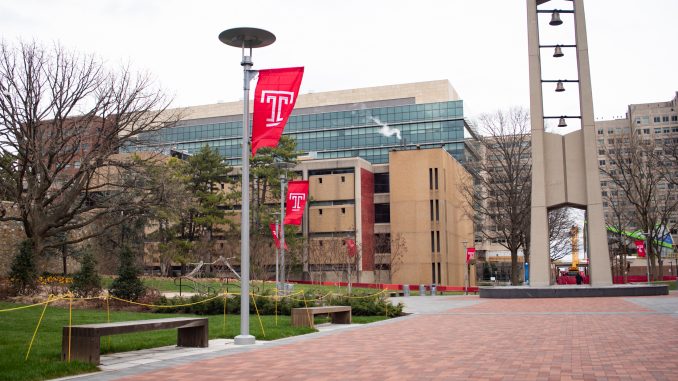
The morning after Temple announced it would suspend in-person classes due to the COVID-19 outbreak, Lauren Mayer, a junior speech, language and hearing science major, knew she would need to be isolated for a period of time.
Mayer is immunocompromised, meaning that because her immune system is weakened she is at a higher risk of getting the virus. She has Ehlers-Danlos Syndrome, Postural Orthostatic Tachycardia and Mast Cell Activation Disorder.
“I realized that I was going to probably be shut off from the rest of the world for a while and that was really scary and disappointing, but it was my reality,” Mayer said. “When there’s a virus going around like this, people like me who are immunocompromised or immunosuppressed have a much harder time fighting viruses and infections.”
Temple’s Division of Student Affairs sent an email to students on Monday encouraging “social distancing,” the practice of limiting physical contact with others, to ease the spread of COVID-19. Federal, state and local officials have advised limiting gatherings to small groups of people and staying at least six feet apart from one another to slow the spread of the virus, the Wall Street Journal reported.
“We’re not having the contacts that we would going to class or being on the buses or trains or going to a concert or shopping at the mall, all of which can expose us to a myriad of respiratory diseases,” said Krys Johnson, epidemiology and biostatistics professor at Temple.
Those who have chronic diseases are more at risk of contracting the virus, Johnson said. Students who are immunocompromised or live with those who are more susceptible to COVID-19 are taking more precautions against the virus.
“Any type of chronic disease can make you more susceptible to having a very severe reaction,” Johnson said.
People who are asymptomatic can spread COVID-19 for a few days before they experience symptoms, Johnson said.
“Even whenever people who think that they’re healthy go out, they can actually be infecting other people,” Johnson said. “So every grocery store they’ve gone in, every restaurant they’ve gone to, every gas pump they’ve pumped gas at has then been contaminated.”
Mayer said that she is sometimes unable to get all the supplies she needs from stores because she avoids the crowds of people panic buying who sweep up all the essentials. However, social distancing protects her and others who are immunocompromised, she said.
Social distancing also slows the spread of the virus so not as many people need medical attention at once, Johnson said. This practice is often referred to as “flattening the curve,” or staggering the number of new cases over a longer period of time, CNBC reported.
“If everyone who is susceptible to severe reaction gets sick at the same time, that’s not enough hospital beds,” Johnson said. “But if we can slow the spread of disease so that people get sick in varying degrees at different points in time, then there will be enough hospital beds.”
Mia Cullen, a senior human development community engagement major, takes care of her grandfather who has lymphoma and Alzheimer’s Disease. Cullen moved from her off-campus home to her parents’ house to keep herself from being exposed to the virus and potentially passing it on to her grandfather, she said.
“When campus closed, I was hell-bent on staying quarantined in my apartment,” Cullen said. “As this pandemic got worse, I knew I had to make the best decision for my grandparents’ health.”
Anyone over the age of 60 is more likely to have a severe reaction to infections, Johnson said.
Cullen can no longer stop and get coffee on her way to her grandparents’ house, she added.
“I haven’t really been able to see any of my friends,” Cullen said. “I’ve kind of just spent a lot of time in my car, away from the public.”
Jade Khedoo, a junior English major, is abstaining from in-person contact with those in her family who are immunocompromised to prevent spreading the virus to them.
“My grandma just got out of the hospital and my mom is immunocompromised so I’m not gonna see them for two weeks to a month,” Khedoo said. “They’re gonna get the worst cases of it if they do get it so I’m trying to wait to contact them just in case because even if I get it, I know it won’t be nearly as bad as if they do.”
The Division of Student Affairs advised students not to attend or host parties in the Monday email, The Temple News reported.
There were six large off-campus parties the weekend before St. Patrick’s Day on Willington, Bouvier, and 16th streets, Ray Betzner, a spokesperson for the university, wrote in an email to The Temple News. Temple Police responded and broke up the parties, Betzner wrote.
Cullen moved to her parents’ house after her neighbors continued to host parties, she said.
“Although I was doing my part and staying in my apartment, my neighbors were not and engaged in day longs and other festivities for the upcoming holiday,” she said.
Cullen said she does not plan on staying in her off-campus apartment until the virus “clears up.”
Mayer said she was disappointed by the St. Patrick’s Day parties that happened last weekend.
“I had a group of college students outside my apartment, drinking and getting sick and talking about [coronavirus] like it was no big deal,” Mayer said. “I’m stuck inside trying to protect myself from the people that are going to these gatherings.”


Be the first to comment